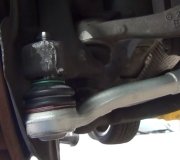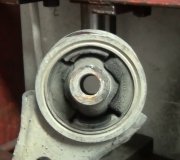I would approach this by running the van in gear on a hoist. As a suspension and alignment specialist, I had a drive-on hoist with jacks that allowed me to raise the vehicles by their control arms. That kept the suspension geometry pretty close to the same normal ride height as when it's sitting on the tires. If a regular hoist is used, the suspension droops and that can make noises disappear.
The things to look for are a wheel weight hitting the lower spring plate on the strut, a warped brake rotor making the caliper slide back and forth, a weld bead on a steel wheel hitting the caliper, and things like that. Try switching the clicking wheel with the one on the other side to see if the noise moves or goes away. Be sure the mechanic is torquing the lug nuts with a click-type torque wrench. If he only tightens them with an air impact wrench, as we commonly did 25 years ago, and doesn't recheck them with a torque wrench, bring it to his supervisor's attention, and consider using a different shop next time.
Some mechanics put a little grease on the wheel studs to prevent corrosion, but if you have anodized studs, that electro-plating is a lubricant already, and adding grease can dissolve that coating. Even worse, if too much grease is used on the studs, then the nuts are spun on with air tools, that grease can build up ahead of the nut and get spun onto the friction surfaces. Those friction surfaces are matched between the wheel and nuts and must remain dry. That is what keeps the nuts from working loose. That can cause a clicking noise too, and that will get worse real fast. If that is what is found, that wheel and those nuts must be replaced. A loose wheel slides around under the nuts and all the surfaces will get chewed up. If the wheel or the nuts are reused, they will transmit their damage to the new parts and keep on coming loose.
Monday, November 16th, 2015 AT 4:57 PM


